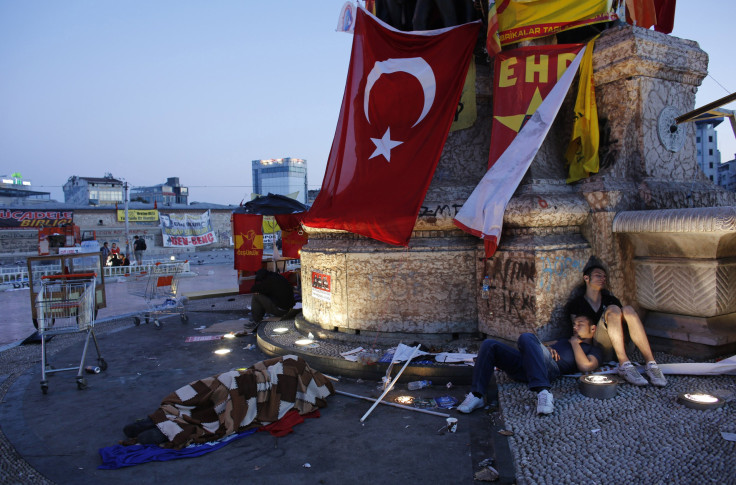What Do The ‘Gezi Park’ Protests Mean For Turkish Democracy?

Dr. Dilshod Achilov, a professor in the Department of Political Science at East Tennessee State University, is in Istanbul and has been witnessing the protests there firsthand. Here he gives IBTimes his views on what the unrest means for democracy.
ISTANBUL -- I was visiting Istanbul when the Gezi Park protests erupted, so I had the unique chance to observe them as they evolved as both social and political events.
The Gezi Park events started as peaceful demonstrations against the municipal government’s controversial construction plans to demolish the small public park in the iconic Taksim Square to make way for a shopping mall. Taksim is situated on the European side of Istanbul and is a popular destination for both tourists and Turkish youth. It is famed for its long pedestrian streets full of restaurants, shops, nightclubs and hotels.
The initial response to the demonstrators by the Turkish police forces was rather punitive, though not surprising given the history of protests and provocations that have routinely taken place in Turkey. Yet the turning point was Prime Minister Recep Tayyip Erdogan’s rather uncompromising and highly dismissive speech in which he called the protesters “capulcu,” looters or marauders.
This rhetoric infuriated the opposition around the country, who expressed their dismay in an unprecedented collective fashion that caught many by surprise. Evidently, the government misread the passion of the demonstrations and did not give them sufficient consideration.
The events quickly metamorphosed into a broader protest against Erdogan’s ruling Justice and Development party, or AKP.
Social media tools such as Facebook and Twitter, as always, played a key role in organizing and, more importantly, sustaining the demonstrations. The name “Chapullers,” a word derived from capulcu, was quickly adopted by Turkish citizens on social media and on the streets.
Who are the protestors and what do they want?
What united the opposition forces against the government was mainly Erdogan’s insulting rhetoric and uncompromising tone against the protests. Even though the AKP collected an impressive 51 percent of the vote in the 2011 polls, that means 49 percent did not vote for Erdogan.
Not surprisingly, the large majority of anti-government demonstrators are traditional critics of Erdogan, mainly from the opposition Republican People's Party, or CHP, and the Peace and Democracy Party, or BDP, camps. The protesters had a point and a message to convey: Even if we did not vote for you, our voice still matters and cannot (and should not) be ignored. We are not just "Chapullers" but part of this nation with a strong voice.
But make no mistake -- this is not Turkey's version of the "Arab Spring." Labeling these protests as a potential “Turkish Spring” mimicking recent events across the Middle East, which ultimately brought down Zine El Abidine Ben Ali in Tunisia, Hosni Mubarak in Egypt, and Moammar Gadhafi in Libya, is rather misguided.
Erdogan is no Mubarak or Ben Ali. He came to power through free, fair and frequent elections. Although his policies and rhetoric are often contested -- the norm in any democracy -- Erdogan still enjoys the support of the majority in Turkey. Whether he is assertive and/or dismissive, thus far, Erdogan’s initiatives have been realized within the framework of Turkish law. In this respect, it would be inequitable to place Erdogan in the same category of authoritarian dictators who, by definition, show no respect for the rule of law.
In the past, the uncompromising position of the prime minister was helpful in achieving certain political reforms and establishing economic stability in the country. Specifically, the AKP deserves the credit for virtually ending the legacy of military dominance on Turkish politics, as well as for the steady and sustained economic growth and rising standard of living, especially at a time when the majority of developed countries are grappling with recession.
Erdogan also deserves credit for jump-starting the critical peace process with the Kurdish separatists, or PKK, which appears to have ended decades of long internal conflict that has claimed thousands of lives.
A natural question then arises: What explains this recent discontent in prosperous, democratic Turkey?
Virtually all the youthful demonstrators grew up during the Turkish economic boom of the past decade and have not lived through the political chaos and deep economic recessions of 1980s, 1990s and early 2000s.
Furthermore, it is plausible that the ego nurtured by the overconfidence inspired by economic and political accomplishments may have contributed to Erdogan’s increasingly assertive rhetoric and, to a certain degree, overconfidence that only the AKP has the “exclusive” competence to fix the nation’s problems.
These protests have sent a clear message, in my view, that says economic and political stability is necessary, but not sufficient for a liberal democracy.
In liberal democracies, public demonstrations establish an essential platform for communication, which is an important dynamic of a strong civil society -- a critical component of democratization.
What is also clear is that many opportunistic groups have captured this moment to push their own anti-regime agenda; unfortunately, throwing Molotov cocktails and setting businesses and cars on fire have damaged the image of genuine protesters who showed up in Taksim Square and elsewhere with legitimate pro-democracy demands.
Many fictitious pictures have circulated in social media claiming a brutal police response, adding fuel to the ongoing conflict. For instance, a picture of an injured boy in an ambulance, taken from a past auto incident, was regarded as a “victim of police brutality” in Taksim by some media outlets.
It is also important to note that protests did not paralyze the country as we have seen in Greece, for example. The protests were relatively small in scale and limited to main squares in major cities around Turkey.
There were virtually no interruptions in public transportation or mundane daily commuting, dining or entertainment in Turkish cities.
The Real Danger
Many analysts would agree it is shortsighted to expect the legacy of the AKP to end in 2014. While the majority of protesters are young, it should be recalled that Erdogan and his policies have the support of many in that demographic.
The real danger, however, is not an unrelenting clash between the police and the protestors, but rather the potential chaos that may erupt if Erdogan’s supporters spill over into the streets to engage the anti-government protesters. This, in my view, is the real danger with potentially grave implications.
Unfortunately, Erdogan is not helping much to ease the tensions. Unlike President Abdullah Gul, Erdogan kept insisting on using a harsh and dismissive tone against the protestors. In this situation, a more inclusive approach could have brought the tensions down in the streets.
Drawing Lessons
These events signify that the AKP government should do more to reach out to those who did not vote for it. It is imperative that Erdogan draws lessons from these protests and reformulate his policies in a more politically inclusive manner. In other words, Erdogan needs to adopt a more permissive, not dismissive, political rhetoric by embracing those who stand in the opposite ideological camps.
Claims that Erdogan will never listen or consider the demands of the opposition factions can hardly be substantiated. If the AKP has managed to sit down with the PKK separatists and strike a historic deal to end a decades-long conflict -- as it appears thus far -- it is plausible to expect that it can certainly reach out to those who sit at the opposite side of the table.
Instead of viewing events dichotomously by lumping the whole unrest as a sinister plot or a premeditated game by the opposition or other international actors (e.g., Iran, Syria), Erdogan can certainly do more by turning this incident into a teachable moment and make it part of a constructive building block for democracy.
On the other hand, instead of asking for Erdogan’s resignation, which is next to impossible given Erdogan’s popularity among the majority of citizens, the opposition forces can channel their efforts through legal demonstrations and should continue their demands within the rule of law. This will help minimize the effects of other political opportunist groups seeking to take advantage of the situation.
In short, what the Gezi Park events have taught us is that Turkey is on a solid and irreversible democratic path. In other words, these events will only help strengthen Turkish civil society and help consolidate its participatory democratic system.
© Copyright IBTimes 2024. All rights reserved.











